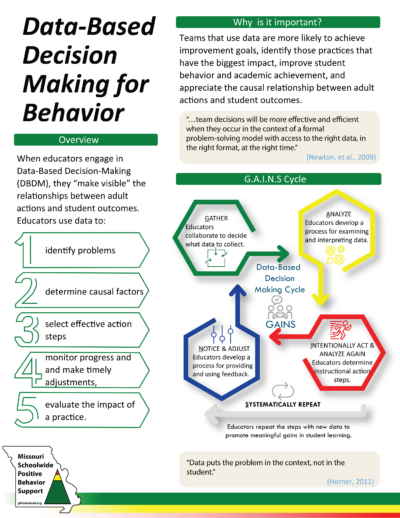Data-Based Decision Making for Behavior
“Know thy impact” (Hattie, 2012).
“What teachers do matters” (Hattie, 2009).
When educators engage in Data-Based Decision-Making (DBDM), they “make visible” the relationships between what educators do and the outcomes experienced by their students. Using data to identify areas for improvement, selecting practices and strategies likely to achieve this improvement, and then monitoring implementation and outcomes to determine if the plan is working or has worked is empowering! When data is used to improve student behavior, it “puts the problem in the context, not in the student” (Horner, 2011).
Learner Objectives: 
By the end of this course, you will…
- know how DBDM fits within the DCI Framework.
- know and assess the prerequisites of DBDM.
- understand the purpose of DBDM.
- understand the essential features of any DBDM process.
- review Office Discipline Referral (ODR) Data for Schoolwide Patterns.
- analyze schoolwide ODR data to define context.
- select targeted, evidence-based practices to address the problem.
- review data to monitor and adjust plans.
- evaluate plan success.
- review the science of behavior, and how academic skills and behavior are interrelated.
- review and analyze behavioral data to make decisions that improve academic and/or behavioral outcomes for students.
- select evidence-based practices that address student needs identified from data analysis.
- monitor progress toward academic and/or behavioral goals.
- evaluate effectiveness of interventions, and make decisions about next steps.
- use data to identify needs and guide action planning to improve district or schoolwide behavior and climate.
Essential Functions:
- Educators establish a collaborative process for collecting data.
- Educators implement a process for examining and interpreting data.
- Educators determine instructional action steps.
- Educators use implementation and student outcome data to determine next steps.
Participant and Presenter Materials
Recommended Prerequisites
- MO SW-PBS Handbook: Section 2 A Systems Approach
- MO SW-PBS Tier 1 Implementation Guide Course 7: Schoolwide Data-Based Decision Making
Participant Materials
Participant Handouts
Pre/Post Assessment: Pre and post-knowledge checks are a component of high-quality professional development. It is recommended that all consultants and other trainers/facilitators use them as they tailor their professional development for their audience. The pre/post knowledge check and the answer key are posted below for downloading and administering.
Presenter Materials
Presenter PowerPoints with Notes: A PowerPoint file with detailed presenter notes is available for the module.
Implementation Supports
![]() Activity Kit 1 Results Indicator Card Sort
Activity Kit 1 Results Indicator Card Sort
![]() Activity Kit 2 Make an Inference
Activity Kit 2 Make an Inference
Implementation Supports
Additional Resources
- Hattie, J. (2012). Visible Learning for Teachers: maximizing impact on learning. London and New York: Routlege.
- Hattie, J. (2009). Visible Learning: a synthesis of over 800 meta-analysis relating to achievement. London and New York: Routlege.
- Horner, R.H. (2011). Moving PBS forward with quality, equity, and efficiency. Keynote: Eighth International Conference of the Association for Positive Behavior Support. Denver: CO.

